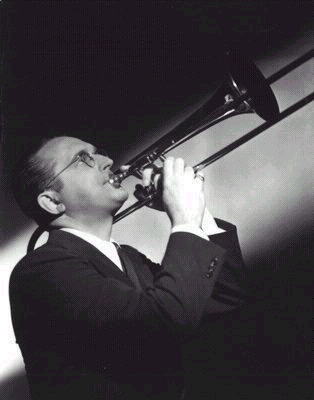
Home
Family
History
Coat of Arms
Military History
Lithuanian History
Shenandoah History
Image Galleries
Map Room
Scrapbook
Links
|
Popalis Family History

Dorsey, Tommy [Thomas]
(Shenandoah, PA, 19 Nov 1905 - Greenwich, CT, 26 Nov 1956)
Trombonist and dance-band leader, brother of Jimmy Dorsey

He studied trumpet with his father, a part-time musician, and later changed to trombone. With his brother Jimmy he was leader of Dorsey's Novelty Six and Dorsey's Wild Canaries, then in the early 1920s played with the Scranton Sirens. Later in the decade Tommy worked with such prominent dance orchestras as those led by Jean Goldkette and Paul Whiteman. He then moved to New York, where he was in demand as a player in studio and pit orchestras. In 1934 he founded with Jimmy the successful but short-lived Dorsey Brothers Orchestra. After a public argument in 1935 the two separated, and Tommy organized a dance orchestra of his own which quickly became one of the most popular of the swing era (see also Clambake Seven). The band's music was characterized by smooth, well-crafted arrangements played with great precision and, at times, with excellent jazz solos by Bunny Berigan, Yank Lawson, Buddy Rich, and others. One of its most successful recordings was Boogie Woogie (1938), an orchestral adaptation of a piano piece by Pine Top Smith; other hits included lively swing versions of Marie and Song of India (1937), both with brilliant solos by Berigan. However, Dorsey's orchestra was known primarily for its renderings of ballads at dance tempos, frequently with singers such as Jack Leonard and Frank Sinatra. After the collapse of the swing-band movement in the late 1940s Dorsey struggled to keep his band intact. Eventually he brought in his brother Jimmy and the two ran another version of the Dorsey Brothers Orchestra (1953-6) which had some success, particularly in its television appearances. Although Dorsey recorded, especially in the 1920s, with Bix Beiderbecke and other major jazz players, he was not a notable jazz soloist. He was vastly admired by other musicians, however, for his technical skill on his instrument. His tone was pure, his phrasing was elegant, and he was able to play an almost seamless legato line; as a player of ballads he has rarely been surpassed. Selected Recordings As leader: I'm getting sentimental over you (1935, Victor 25236); Marie/Song of India (1937, Victor 25523); Boogie Woogie (1938, Victor 26054); I'll never smile again (1940, Victor 26628); Opus One (1944, Victor 20-1608) As sideman: J. Bland: Who stole the lock (1932, Banner 32605); [no leader: Jam Session at Victor]: Honeysuckle Rose/Blues (1937, Victor 25559) Bibliography G. T. Simon: The Big Bands (New York, 1967, revised and enlarged 2/1971, revised 3/1974, 4/1981) H. Sanford: Tommy and Jimmy: the Dorsey Years (New Rochelle, NY, 1972) C. Garrod, W. Scott, and F. Green: Tommy Dorsey and his Orchestra (Zephyrhills, FL, no date of publication [?1980-1982]) [discography] S. Voce: "Talking of Tommy," Jazz Journal International, xxxviii/2 (1985), 20
James Lincoln Collier
The New Grove Dictionary of Jazz, ? Macmillan Reference Ltd 1988
Copyright © 2000 - 2014 by Andrew J. Popalis
All Rights Reserved
Privacy Policy
|